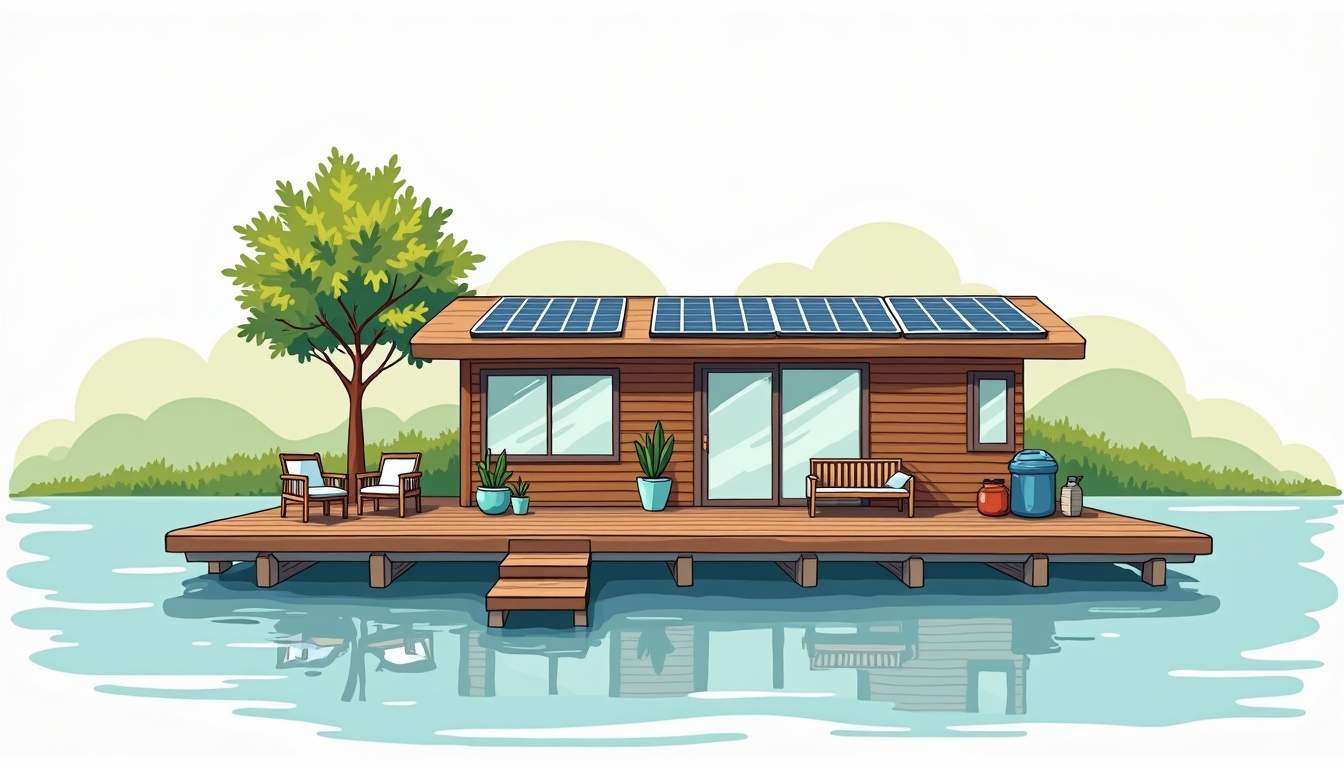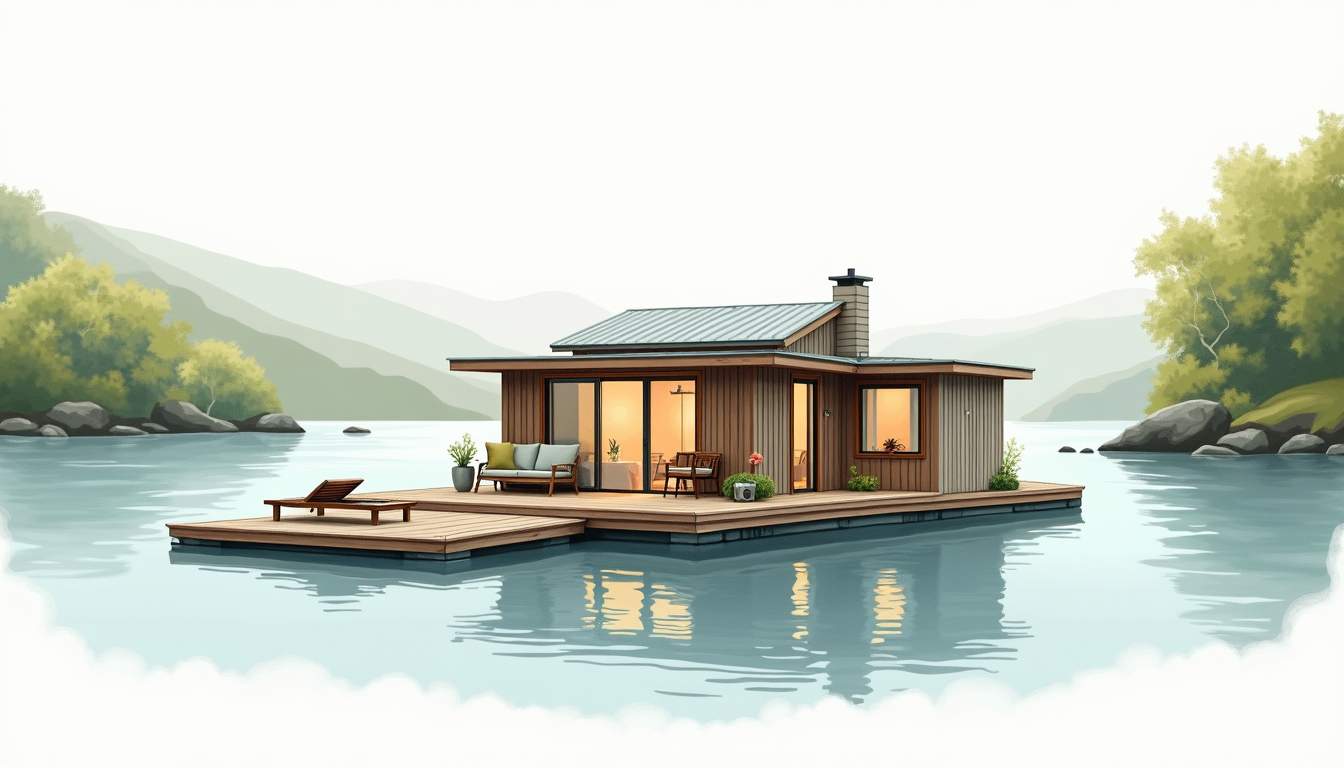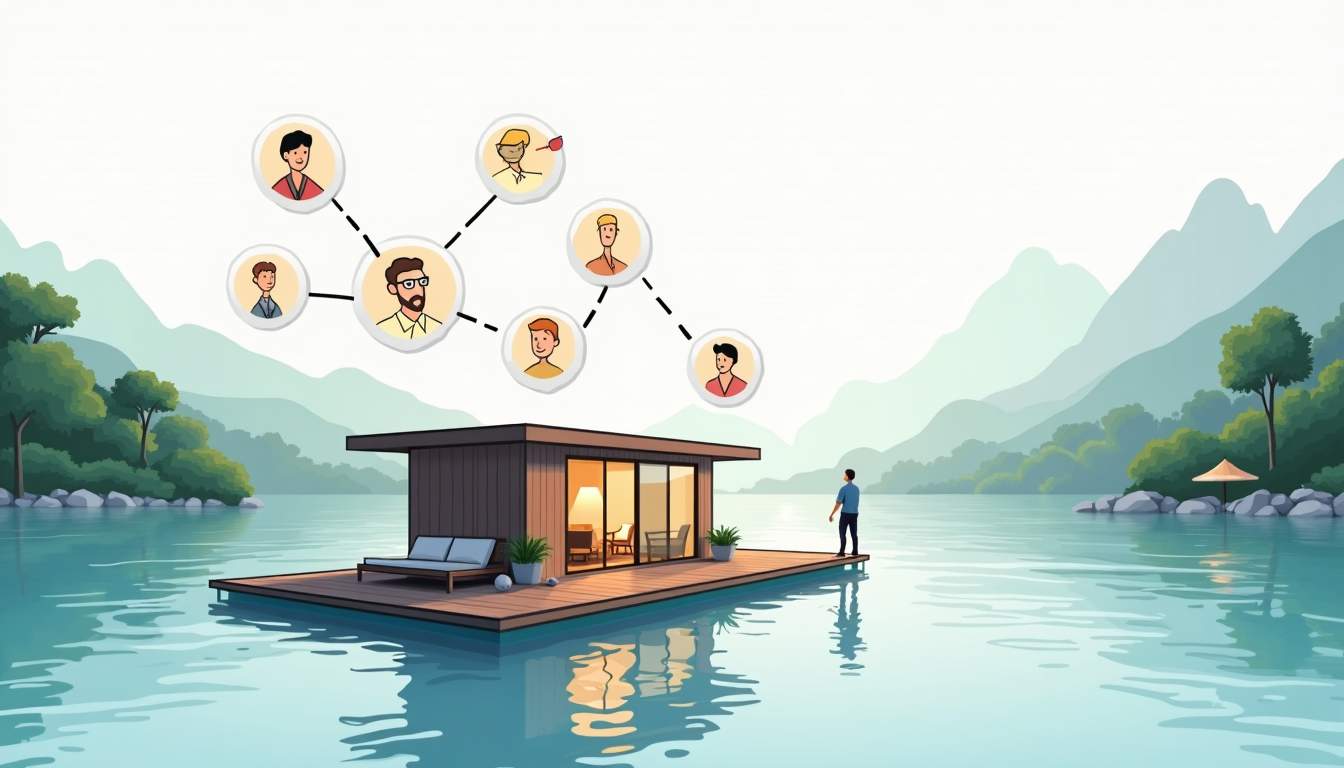
Floating homes have become a distinctive part of the Loudon resort landscape, blending lakeside living with a cozy, community-oriented lifestyle. This guide explains what buyers, residents, and prospective hosts need to know about purchasing, living on, and renting out a floating home in the Loudon area — from practical costs and legalities to maintenance and neighborhood culture.
Floating homes are permanent residential structures built on buoyant platforms, moored in marinas, coves, or along private shorelines. Unlike houseboats, they are typically stationary and connected to shore utilities, offering the comforts of a conventional home with the added benefit of water-based living. The Loudon resort area, with its calm coves, established marina infrastructure, and seasonal tourism, has become an attractive place for this style of living.
Loudon’s mix of recreational amenities — boating, fishing, hiking, and nearby dining — creates year-round appeal. For buyers seeking a retreat that feels like vacation every day, or for investors targeting short-term rental markets, floating homes combine lifestyle appeal with practical access to facilities that support daily living and guest services.
Purchasing a floating home involves many of the same steps as buying a terrestrial house, but there are key differences: moorage rights, platform condition, and local marina rules often play as big a role as brick-and-mortar inspections. A thorough understanding of what’s included in the sale — berth, dock lines, utilities, and any shared maintenance responsibilities — is essential.
Floating homes in the Loudon resort area vary widely in price. Factors that influence value include size, age, proximity to resort amenities, and the quality of the marina or moorage facility. Financing options can be more limited than for traditional homes. Some lenders treat floating homes similarly to manufactured homes and require chattel loans or specialized mortgages. Local banks and credit unions that understand the market are often the best starting point.
Legalities are crucial. Some floating homes are classified as real property if permanently affixed and assessed by county tax authorities; others remain personal property. Zoning rules and marina regulations may restrict use, renovations, or rental activities. Moorage agreements establish rights and responsibilities for dock space and shared infrastructure — these documents must be reviewed carefully, since they can include fees, transfer restrictions, or requirements for marina-approved contractors.
Inspection of the flotation system, hull, and underpinning structure is critical. Waterline issues, corrosion, rot, and compromised flotation can be costly to repair. Electrical and plumbing systems often require specialized inspection given the proximity to water. Engage marine-savvy inspectors and contractors who understand both residential systems and maritime standards to avoid unpleasant surprises.
Daily life on a floating home brings unique pleasures and considerations. Most residences offer comfortable interiors and modern amenities but require some adaptation to water-based living. Noise from waves, seasonal water level changes, and marina activity are normal parts of the experience and should be considered when choosing a location within the Loudon area.

Many floating homes have shore-based hookups for electricity, water, and sewage, though some rely on holding tanks or pumps. Internet and cable services are usually available, but options may be limited in more remote moorings. Routine marina services — fuel docks, pump-out, and garbage collection — are important conveniences. Confirm which services are included with the moorage and what costs are billed separately by the marina.
Preventive maintenance is more frequent for floating homes than for most land-based residences. Routine tasks include inspecting flotation pontoons, maintaining anchors and mooring lines, caring for hull coatings, and winterizing plumbing systems. Seasonal climate shifts in the Loudon region require attention to ice management, storm preparedness, and secure storage for removable fixtures. Budgeting for annual maintenance and emergency repairs will keep the property safe and habitable.
Safety measures include proper non-slip decking, secure railings, life-saving equipment, and well-lit walkways. Accessibility can be a challenge if the dock system uses long gangways or has steep rises; renters and guests with mobility concerns should be considered when purchasing or listing a property. Also important are safe electrical installations and corrosion-resistant fixtures designed for marine environments.
Renting out a floating home, whether short-term for vacationers or long-term to residents, can be profitable but requires careful planning. The Loudon resort market attracts visitors seeking waterfront experiences, so a well-presented floating home in a convenient location can command strong rental rates — especially during peak season.

Vacation rentals on the water appeal to families, anglers, and couples seeking waterfront ambiance. Listing platforms that emphasize unique stays often enhance visibility. High-quality photos, accurate descriptions of access and marina rules, and clear instructions about waterways and recreational gear improve guest experience. Stocking essentials, providing clear check-in/out procedures, and having a local contact for maintenance or emergencies will reduce negative reviews and increase repeat bookings.
Short-term rental regulations can vary significantly across municipalities and resorts. Regulations may cover occupancy limits, safety standards, business licensing, transient occupancy taxes, and even noise or parking restrictions. Some marinas prohibit vacation rentals, while others require host registration. It’s essential to verify local laws and marina policies, and to obtain any necessary permits and insurance specific to rental operations.
Long-term leasing can provide steady income but requires tenant screening and clear lease terms that address marina rules, utility payments, and maintenance responsibilities. Leases should delineate liability for minor repairs versus major structural issues and clarify who is responsible for dock damage or vandalism. Establishing a security deposit schedule and documenting the condition of the home before tenancy reduces disputes.
Floating-home communities in Loudon tend to be tight-knit, with neighbors sharing an affinity for water activities and a slower, more relaxed pace. Communal facilities such as clubhouses, slip-side gathering areas, and local festivals foster social connections. For families and retirees alike, access to trails, marinas, and waterfront dining contributes to a lifestyle distinct from inland suburban living.
Community rules may affect everything from exterior painting and dock decoration to noise and pet policies. Prospective buyers and hosts should attend homeowners’ association or marina meetings if possible to get a feel for the social dynamics and expectations.
Owning a floating home involves predictable and variable costs. Predictable costs include moorage fees, utilities, insurance premiums, and routine maintenance. Variable costs arise from unexpected repairs, marina special assessments, or storm damage. Budgeting conservatively, with a dedicated reserve for repairs, is prudent for property longevity and financial stability.
Insurance for floating homes often differs from standard homeowners’ policies. Coverage should include protection for the structure, personal property, liability for guests, and possibly coverage for transient water conditions. Policies commonly cover fire, theft, and certain weather events, but coverage for flood, tidal surge, or storm surge may require separate riders or separate policies. Work with an insurer experienced in marine or waterside properties to ensure proper coverage.
Property tax treatment varies: some floating homes are assessed as real property, others as personal property. Tax assessment can affect mortgage eligibility and long-term ownership costs. Additionally, rental income is taxable, and applicable local lodging or occupancy taxes may apply to short-term rentals. Consulting a tax advisor familiar with waterfront properties helps clarify liabilities and potential deductions for maintenance and depreciation.
Floating homes offer unmatched access to water, a unique aesthetic, and often a strong sense of community. For nature lovers and those seeking a lifestyle change, these homes deliver a blend of residential comfort and waterfront adventure. On the other hand, they require a willingness to embrace specialized maintenance, potential restrictions from marina management, and a readiness for higher insurance and moorage costs.

Potential buyers should weigh lifestyle benefits against the practicalities: ongoing maintenance, special financing arrangements, and regulatory constraints. For investors, the choice to rent should consider market seasonality, local rental rules, and the additional effort of maintaining a waterfront rental property.
Before purchasing or listing a floating home in the Loudon resort area, confirm the following:
- Clear title and whether the home is classified as real or personal property.
- Details of the moorage agreement, including fees, transfer rules, and maintenance responsibilities.
- Results from a marine-savvy structural inspection, including flotation, hull, and utility systems.
- Local regulations on rentals, occupancy taxes, and required permits.
- Insurance options that cover water-specific risks and adequate liability protection.
- Community rules and neighbors’ expectations regarding noise, pets, and dock usage.
Floating homes in the Loudon resort area present a distinctive opportunity to live and host on the water, combining resort-style living with everyday comforts. Success as an owner or host depends on careful due diligence — understanding moorage agreements, securing appropriate financing and insurance, and committing to regular maintenance. With the right preparation and realistic expectations, a floating home can bring years of enjoyment, memorable guest experiences, and a unique place to call home.
Ready to embrace the unique lifestyle of waterfront living combined with luxury resort amenities? At Tennessee National, enjoy access to a private marina, scenic trails, and a Greg Norman Signature Golf Course—all within a secure, gated community. Whether you're interested in a move-in ready home or a custom build, our variety of living options caters to those seeking both comfort and adventure. Schedule a Private Tour today and start making memories every day at Tennessee National.